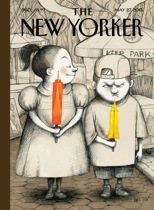date newest »
newest »
 newest »
newest »
message 1:
by
Jin
(new)
May 22, 2013 07:32PM
 I think this story is meant to be satirical, although not without sincerity. I don't think it's a sexist story, but the entire story is the projection of the narrator's male gaze. All the wives, none of whom has a voice in the story, are the objects of the gaze of the narrator, who is the subject without a form. This formlessness allows his gaze to represent the gaze of any man in this culture. But the story is more complicated than a polemic against gender inequality or male domination. There are many a moments that are written with such sincerity, which makes the narrator someone that many people, men or women, can sympathize with. Essentially, the story is a depiction of a fantasy for many men, and because it will never be real, it is ever more beautiful.
I think this story is meant to be satirical, although not without sincerity. I don't think it's a sexist story, but the entire story is the projection of the narrator's male gaze. All the wives, none of whom has a voice in the story, are the objects of the gaze of the narrator, who is the subject without a form. This formlessness allows his gaze to represent the gaze of any man in this culture. But the story is more complicated than a polemic against gender inequality or male domination. There are many a moments that are written with such sincerity, which makes the narrator someone that many people, men or women, can sympathize with. Essentially, the story is a depiction of a fantasy for many men, and because it will never be real, it is ever more beautiful.
reply
|
flag




